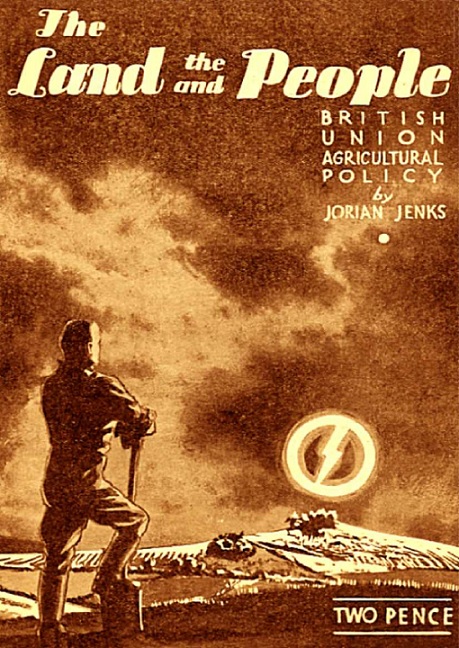
Jorian Jenks - The land and the people
The British Union Policy for Agriculture
FOR at least sixty years Britain's agriculture has been going downhill. Since 1870, when the flood of imports first assumed formidable dimensions, we have lost no less than 6 million acres of ploughland, including 4 million acres of cereals. By no means the whole of this land has been converted into useful pasture, nor can increments in live-stock be said to compensate for the loss. Our sheep are actually fewer by 3 millions, and increases in cattle, pigs and poultry are more than offset by heavy imports of feedingstuffs.
This tragic decline is not due to natural causes. Our land and our climate are still among the best in the world ; our agriculturists of all classes rank equally high ; and we can yet show some excellent examples of intensive farming. The blight which hangs over the countryside is the blight of persistent and deliberate neglect on the part of those responsible for our economic policy. No nation has a greater need of a productive agriculture ; no nation has made less effort to achieve it.
The excuses advanced for this deplorable attitude are palpaple distortions of fact. Thus there is the glib statement that "we cannot feed ourselves," though no serious effort has yet been made to develop the full productivity of our soil, which expert opinion puts at fully double its present output. Again, it is said that people "cannot afford" to pay a fair price for their food, as if the poverty of consumers were the responsibility of producers. Actually the"cheap food" talk comes from vote hunting politicians rather than from the general public. And finally there is the extraordinary assumption that we can live only by selling manufactured goods to the rest of the world in exchange for its surplus foodstuffs, a dangerous assumption indeed at a time when there is a world-wide trend towards self-sufficiency.
The plain truth underlying these specious excuses is that money invested in foreign-trade and international finance exercises a dominating influence over politics. Those who would benefit from a regeneration of our agriculture far outnumber those who derive profit from the international money-system. But because the latter have financial power, and therefore political influence, their interests are given priority. To such depths has " democracy " fallen. Agriculture has been sacrificed ; not because " farming doesn't pay," but because its activities might interfere with the flow of tribute to Mammon.
THE COST OF NEGLECT
Economic decay cannot be localised. The decline of agriculture has affected, not only agriculturists, but the whole community. A "cheap food" policy is in fact a delusion.
(1) For several generations there has been a steady migration of farmers and farm workers from the land to the towns. Since 1921 England and Wales alone have lost nearly a quarter of a million farm employees, and the rate of decline is tending to increase. Since these migrants are forced to compete with urban and industrial workers, the effect on wage-levels and unemployment is obvious.
(2) In the towns themselves malnutrition exists to a degree which amounts to a public scandal in an allegedly prosperous community. Politicians boast that none need starve, but ignore the fact that much of the stale, preserved imported food on which many of our people are forced to exist is little more than " fill-belly." An urban population, living as it does in unnatural surroundings, needs above all else an abundance of fresh, wholesome food to enable it to resist disease and attain full physical development. This it is denied by neglect of agriculture. The divorce from the soil is complete.
(3) The foreign trade on which our economic system is supposed to be based is crumbling away, leaving us the grim legacy of the Distressed Areas. Despite desparate efforts on the part of politicians and bankers, it can never be adequately restored, for the good reason that most of our former customers are now making for themselves the goods which they formerly bought from us. Even in the few markets which remain, the British worker is coming increasingly into competition with cheap Asiatic labour, competition which has been made possible by the export of British machinery and capital. Meanwhile, we have an ever-growing bill for imports, a bill which will become more and more difficult to meet.
(4) Instead of replacing our lost export trade with genuine domestic trade, we have acquired the habit of depending upon a series of " booms." These are artificially engineered by the financial machine as a source of profit to itself and as an outlet for its accumulated funds. They are but temporary and demoralising stimulants, which cannot be an adequate substitute for natural trade between town and country.
(5) We have become the most vulnerable nation in the world, both in the economic and military senses. In periods of abundance our producers are ruined by dumped imports ; in periods of scarcity, our consumers are held to ransom by speculators. A short world harvest, or a financial collapse, can bring us to the brink of starvation ; war with a major Power would soon push us over the edge. No Navy or Air-force, no matter how efficient and well-armed, can guarantee our food-supply so long as two-thirds of it must run the hazards of the seven seas and subsequently enter by a few bottle-neck ports. A government which undertakes the task of national defence without expanding home food-production is guilty of criminal neglect.
Is this then to be the fate of Britain, the Britain of Elizabeth and Victoria, of Drake and Nelson ? To degenerate slowly into a community of town-bred, under-nourished weaklings, a parasite nation dependent for its very existence upon the charity of international financiers, upon the goodwill and forbearance of other and more virile countries ? Or shall we realise in time that there is a way, Mosley's way, in which we can recover national health, security and independence, in short our true nationhood ?
...
Fascism on Balder Ex-Libris




